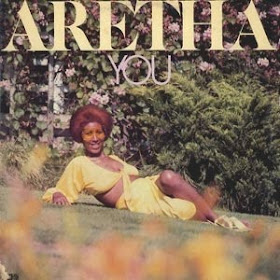
ARETHA FRANKLIN: YOU (1975)
1) Mr. DJ (5 For The DJ); 2) It Only Happens (When I Look At You); 3) I'm Not Strong Enough To Love You Again; 4) Walk Softly; 5) You Make My Life; 6) Without You; 7) The Sha-La Bandit; 8) You; 9) You Got All The Aces; 10) As Long As You Are There.
Aretha hit the first of her several commercial nadirs here, although it is not easy to understand why: surely much of this stuff is at least on par with those huge Barry Manilow hits of the decade in terms of attention-grabbing, and most of it is far less comatose. But considering the popular success of the ballad-choked Let Me In Your Life and the relative failure of her next two LPs, it is likely that «comatose» is just what the public wanted from the Queen of Soul.
Instead, she gave them her liveliest, most recklessly party-oriented get-it-up single in years — 'Mr. DJ', wobbling on a classy, irresistible funky groove — and was thanked by seeing it stall somewhere in the middle of the Top 100. It is certainly no 'Rock Steady'; totally devoid of the seductive dark aspect of the latter, it is, like the lyrics honestly state, a simple paean to all the disc jockeys out there who gotta "shake their funky soul", but it's brilliantly executed dance fun that should have been vastly popular, but wasn't — perhaps because the smoother, glossier disco attitudes were already crawling in.
A few other tracks are likeable pop-R'n'B hybrids ('It Only Happens', 'You Make My Life'), but the major other highlight is 'Without You', another slice of superb Atlantic funk with a bumble-bee bass line to die for. Together with 'Mr. DJ', these two tracks are enough to constitute a strong argument for getting the album back in print, no matter how much a handful of the usual tepid ballads would call for the opposite.
Aretha's brief flirt with reggae on 'You Got All The Aces' is, however, not at all successful; dressing reggae rhythms with gentle background vocals, R'n'B brass, and an overall sweet pop attitude will almost inevitably produce a pointless, lifeless hybrid — in fact, most attempts to adapt the Jamaican spirit of reggae to generic mainstream entertainment values of the 1970s are about as lame as an attempt by, say, Neil Diamond to sing the blues.
Overall, You's weakest side is that the ratio is again somewhat skewed in favour of lighter material; count but two «hardcore» R'n'B numbers, four fluffy dance-pop numbers (including the unlucky reggae bit), and four rosy-cloudy ballads, none of which rises above generic. Where are all those gospel roots? Did she get so sick of them after the Amazing Grace experience, or was there somehow a general industry consensus that, with disco on the rise, God must have embarked on a three-year picnic? Unclear. What is clear is that You fits in beautifully into the fluff-head, hedonistic atmosphere of «The Me Decade», but does not engage in the filthiest of its excesses, and at least the excellent musicianship, moderately acceptable songwriting level, and Aretha's usual professionalism make it still worth an occasional listen.
No comments:
Post a Comment
Note: Only a member of this blog may post a comment.